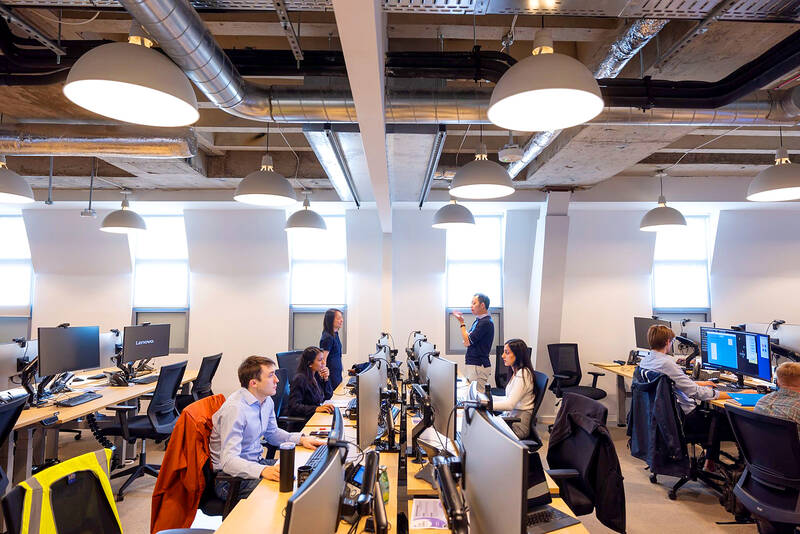Goldman Sachs Group Inc is embarking on its biggest round of job cuts since the start of the COVID-19 pandemic.
The Wall Street titan plans to eliminate several hundred roles starting this month, people with knowledge of the matter said. While the total number is less than some previous rounds, the reductions are a resumption of Goldman’s annual culling cycle that it had largely paused during the pandemic.
The move from the banking bellwether is the surest sign yet of a chill that has set in across the industry amid a slump in revenue after record-breaking years.

Photo: Bloomberg
Analysts expect the bank to post a more than 40 percent drop in earnings this year, according to data compiled by Bloomberg.
The New York-based firm in July said that it planned to slow hiring and reinstate annual performance reviews — foreshadowing the job cuts it planned to undertake later in the year.
It is an effort to rein in expenses amid what it called a “challenging operating environment.”
The reviews are typically used to weed out the worst-performing staff.
Goldman could also reduce the pace of replacing staff it loses because of attrition, chief financial officer Denis Coleman said at the time.
Goldman had 47,000 employees at the end of the second quarter of this year, compared with 39,100 two years earlier, aided by recent acquisitions.
The New York Times earlier on Monday reported that Goldman was preparing job cuts.
A Goldman spokeswoman declined to comment.
Like its Wall Street competitors, Goldman has been hurt by the dramatic slowdown in investment banking as the volatility that has spurred gains for trading also weighed on capital markets and asset management.
While the firm’s trading operation posted a 32 percent surge in revenue in the second quarter, investment-banking revenue fell 41 percent, reflecting a sharp drop in underwriting.
Total operating expenses declined in the second quarter from a year earlier as Goldman reduced compensation and benefits, but the company also reported increases in costs from growth initiatives.

Macronix International Co (旺宏), the world’s biggest NOR flash memory supplier, yesterday said it would spend NT$22 billion (US$699.1 million) on capacity expansion this year to increase its production of mid-to-low-density memory chips as the world’s major memorychip suppliers are phasing out the market. The company said its planned capital expenditures are about 11 times higher than the NT$1.8 billion it spent on new facilities and equipment last year. A majority of this year’s outlay would be allocated to step up capacity of multi-level cell (MLC) NAND flash memory chips, which are used in embedded multimedia cards (eMMC), a managed

CULPRITS: Factors that affected the slip included falling global crude oil prices, wait-and-see consumer attitudes due to US tariffs and a different Lunar New Year holiday schedule Taiwan’s retail sales ended a nine-year growth streak last year, slipping 0.2 percent from a year earlier as uncertainty over US tariff policies affected demand for durable goods, data released on Friday by the Ministry of Economic Affairs showed. Last year’s retail sales totaled NT$4.84 trillion (US$153.27 billion), down about NT$9.5 billion, or 0.2 percent, from 2024. Despite the decline, the figure was still the second-highest annual sales total on record. Ministry statistics department deputy head Chen Yu-fang (陳玉芳) said sales of cars, motorcycles and related products, which accounted for 17.4 percent of total retail rales last year, fell NT$68.1 billion, or

In the wake of strong global demand for AI applications, Taiwan’s export-oriented economy accelerated with the composite index of economic indicators flashing the first “red” light in December for one year, indicating the economy is in booming mode, the National Development Council (NDC) said yesterday. Moreover, the index of leading indicators, which gauges the potential state of the economy over the next six months, also moved higher in December amid growing optimism over the outlook, the NDC said. In December, the index of economic indicators rose one point from a month earlier to 38, at the lower end of the “red” light.

In Italy’s storied gold-making hubs, jewelers are reworking their designs to trim gold content as they race to blunt the effect of record prices and appeal to shoppers watching their budgets. Gold prices hit a record high on Thursday, surging near US$5,600 an ounce, more than double a year ago as geopolitical concerns and jitters over trade pushed investors toward the safe-haven asset. The rally is putting undue pressure on small artisans as they face mounting demands from customers, including international brands, to produce cheaper items, from signature pieces to wedding rings, according to interviews with four independent jewelers in Italy’s main